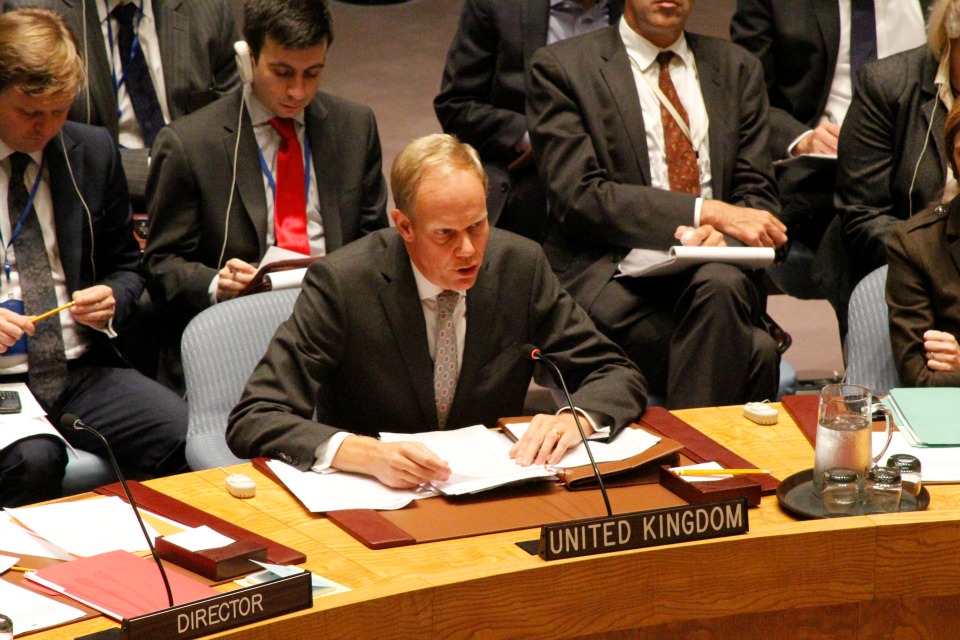"We are at our best when we respond to events quickly and efficiently."
Statement by Ambassador Matthew Rycroft of the UK Mission to the UN at the Uruguay Presidency of the Security Council Wrap Up Session

Thank you Mr President.
Let me join others in thanking you, Elbio [Rosselli, Uruguay Permanent Representative], and your team for a successful Presidency. You have guided the Council through an eventful month, and you and the other new members of the Council have really hit the ground running. I very much agree with what [Japanese Permanent Representative] Motohide said on brevity.
We appreciate that you have chosen to hold a wrap up briefing at the close of your month. I note that the three most recent presidencies all hold informal wrap ups outside this chamber, with all General Assembly members. These have the benefits as these sessions in terms of transparency, but they have the added benefit of allowing interactivity, allowing all General Assembly colleagues to ask us questions.
Whether we do them formally or informally, I hope that we can use these sessions to draw lessons on our working methods and here are three specific lessons drawn from experience this month. They are not criticisms of the Presidency, quite the opposite; they are encouragements to go further still in modernising the working methods of the Security Council.
First of all, we saw in Burundi how Council visits can have a real impact on the challenges that we face. We sent a strong message when we returned to Burundi just 10 months after our last visit. And we made clear during our visit that we expect progress on what I call the 3 Ds; de-escalation, dialogue and some form of deployment of an international presence.
However, there is a fourth D: delay. There was a delay in agreeing the visit to Burundi. And I think that delay was not good enough. The situation deteriorated, and our delay weakened our message at a time when sustained pressure was needed. So I wonder whether we should move away from consensus in agreeing such visits. If some Council members don’t want to come on a visit, let’s not allow them to undermine the entire Council. Going further, perhaps there would be value in setting aside a week every four months or so where all Council members would be encouraged to visit an area on our agenda, whether as a whole, or in a group or even individually. This so-called visiting week could allow us all to do some real diplomacy and outreach, and engagement and even prevention or resolution of conflicts.
Second, we are at our best when we respond to events quickly and efficiently. Our work on Colombia this month was a good example of how we can work quickly and flexibly to get an important issue onto our agenda. And I’m hopeful that our actions will herald a new era for everyone in Colombia.
Even our session on Madaya in Syria had a bright side in terms of putting the spotlight on an immediate issue that can put pressure on those responsible. It was well timed given the London conference next week– and I hope the profile we’ve given will encourage every participant in London to pledge generously to help both the immediate and the long term needs of the people in Syria and the region. And that means more support for education, more support for job creation, and ultimately, more hope for the future.
Not all of our sessions have such a clear purpose. Regular debates, regular briefings, regular consultations fill up our programme of work and often lead just to the repetition of well known positions rather than genuine engagements or progress.
The Council adds most value when responding to events as close to real time as possible, rather than according to arbitrarily fixed reporting cycles. So rather than clogging up the programme of work, let’s try to leave enough time to be agile in the face of ongoing issues. The crises of the world don’t operate on a quarterly basis, so our response to them shouldn’t either.
Third and finally, one of the most important responsibilities for the Security Council in 2016 is to recommend to the General Assembly who the next UN Secretary-General should be.
Outside the Security Council, a lot of people are doing good work to help us answer that question. Inside the Council, we have some catching up to do on what we want from the next Secretary-General, on what challenges he or she will face, how we can work together to overcome them.
To address these questions and more, the United Kingdom will call for an AOB discussion on this issue next month. To ensure that we get the best candidate for the job, it is vital that we mirror the activism being shown on this issue outside the Council. So, in conclusion, well done Elbio for January, good luck Raphael for February and let us all focus on improving still further our work, in term of transparency, interactivity, efficiency and impact.
Thank you.